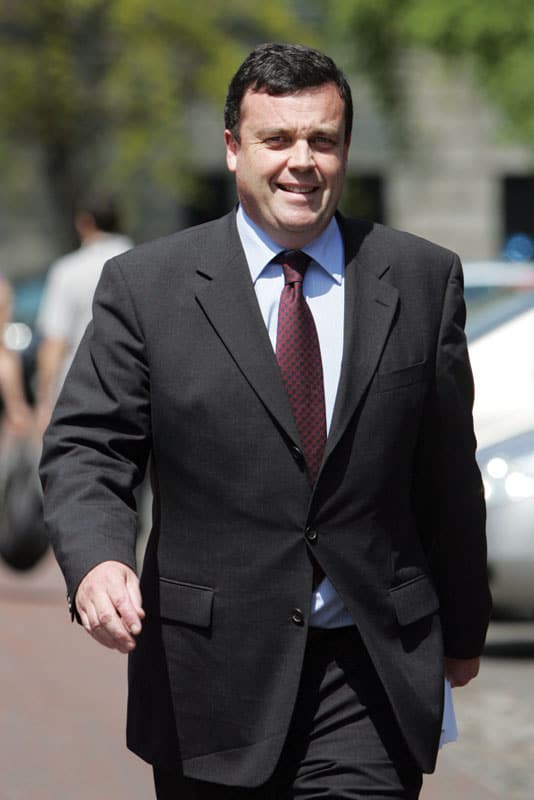The Minister for Finance Brian Lenihan talks to John Walsh about Nama, the bank deposit guarantee, recapitalising the banks, Anglo Irish Bank and the proposed bank enquiry.
Brian Lenihan says that the immediate priority for the Government is to get the bank loans transferred to Nama and then deal with the holes in the capital bases of the banks following this transfer. That will be done in the first six months of this year. The multi-billion euro questions are: how big are the discounts and what is the appropriate level of core equity ratios that each bank should have following the Nama transfers. If the discounts are too small, then the prospects of Nama succeeding in its longer-term aim is limited. The higher the discounts for the banks, the bigger the holes in their capital bases. The Minister declined to give specific answers to these questions on the basis that the information is highly market sensitive.
“The figures announced last September [when Nama’s business plan was published] are an estimate. I have always made clear that the final figure would be established with the collateral of each loan and that has to be finalised yet. Nama is working through the larger collateral items and, on that basis, there has been a lot of speculation that the figures are coming in lower but I cannot comment on that at this stage.”
There seems to be a consensus growing across OECD countries that the appropriate level of core equity ratio for the banking system is 8%. Even though the exact haircuts Irish banks will take in the Nama process still has to be worked out, what is certain is that their core equity ratios will be well below 8% once their loans have been transferred. Lenihan declined to say whether he deems an 8% core equity ratio an appropriate level for the Irish banking system.
“Again, that will be determined after consultation with the Central Bank but the figure is very sensitive. It will have to be set by the Central Bank and I will take into account what they have to say.”
To nationalise (or not)
How the banks address their capital positions will determine whether the Government will end up being the majority shareholder, if not the outright shareholder, in the domestic banking system. This is an extremely thorny political issue. The Opposition parties are still implacable in their opposition to Nama. Fine Gael favoured a good bank/bad bank solution which found a good deal of support among some of the world’s leading economists including Willem Buiter and Martin Wolf. Labour called for the temporary nationalisation of the banking system. Unsurprisingly, the Minister is withering in his assessment of both of these alternatives.
“Fine Gael has never proposed any realistic proposal in relation to banking. Fine Gael has no alternative plan formulated other than a bank they say they can capitalise for €2bn and which they say will generate €20bn in loans. No independent commentator has said that has any credibility.
“If we had temporarily nationalised the banks in September 2008 the system would have collapsed because she [Labour finance spokesperson Joan Burton] would not give a guarantee. Secondly, if we took her advice on nationalisation, all funding would have dried up because once you nationalise, you have to fund, as we found out with Anglo [Irish Bank].”
In view of the normal recessionary losses that still have to be dealt with by the banks and the still challenging economic environment, there is a growing consensus among banking analysts that it is highly probable that Irish banks will not be able to capitalise themselves and that the Government will be forced to take majority shareholdings with the probability of outright nationalisation also increasing.
In this event, wouldn’t it have been much cheaper for the Government to have pursued the nationalisation option when Burton suggested? Lenihan stresses that he never ruled out nationalisation, insisting that it was always his option of last resort. “What I ruled out was blanket nationalisation.” Lenihan argues that if the Government had pursued blanket nationalisation, then that would have been a de facto default on national debt because senior bondholders of the banks were covered by the State guarantee. Moreover, a banking collapse and economic meltdown similar to what happened in Iceland would have been inevitable because funding would have dried up.
“Let me be very clear about this, the Government has been absolutely constant in its policy. We made it clear that if the banks had to be capitalised then we would do it. Naturally we would like to see private funds attracted into them. It is a sign of weakness if they cannot. Advertising that weakness to the world by saying let’s own 100% now is not a sensible option. It also seems to me that at the back of this, there is an idea that nationalisation can be done on the cheap. It is not. When you own a bank, you have to fund it.”
The future of Anglo
There are growing calls to wind down Anglo Irish Bank. It was nationalised in January 2009 when it became clear that the institution was about to collapse under a mountain of bad debts. Some commentators claim that it should have been allowed to collapse. Lenihan says that this was never an option because Anglo was too systemically important to the economy because of its size relative to the national GDP.
There are suggestions that Anglo could be turned into an SME specialist lender, although there is a good deal of scepticism that this could be achieved because the skills base and the focus of the bank has been that of a monoline property lender for well over a decade. Fine Gael says that it would wind down the bank over a nine-to-ten year timeframe if it got into power. Lenihan says that he has asked for details of how this could be done but that he has received nothing in response from the main Opposition party. His main priority is to downsize the bank and lessen the potential hit on the taxpayer stemming from Anglo liabilities, he says.
But would he consider winding the bank down over the longer term? “The submissions have been made [to the EU Commission] and they are being examined. It will be looked at over the next six months”
There is speculation that one of the commission’s proposals is to split Anglo into a good bank/bad bank with the subordinated debt going into the bad bank. If this scenario were to pan out, then there is a possibility of a default on subordinated bonds. “In relation to subordinated debt in Anglo, a substantial amount is unguaranteed but there is no question of a default arising. It is only dated subordinated debt that is covered by the guarantee and there is very little of that in Anglo.”
In terms of the rollover of the State guarantee for the banks, Lenihan says that there is legislation in place that covers medium-term funding requirements for the banks which has been approved by the Oireachtas. Subordinated debt will not be included in this rollover. “The position of a senior bondholder is no different to an inter-bank lender or an unsecured creditor under Irish law. They have an unsecured debt with the bank. Deposits of €100,000 will be covered, how far we go beyond that remains to be seen.”
Bank enquiry
Lenihan says that the Government’s proposals for the banking enquiry are the correct course of action. He describes as “irresponsible” the Opposition’s calls for a full enquiry over the first six months of this year. He says that has the potential to collapse the banking system at the same time it needs to be recapitalised.
The enquiry needs a solid framework, all the facts have to emerge and it has to be expedient, says the minister.
“Criticism has been made that if anything untoward happened after September 2008, it will not come to light. I have made it clear that as far as banking practices are concerned, if there were any practices that carried on after September 2008 they will be brought into the scope of the enquiry. The Government has made it clear that the political decisions that were made from the guarantee onwards are a separate matter. That is a political matter.”
This interview took place on January 27th in the Department of Finance.
‘I never suggested a merger of BoI with IL&P’
Lenihan on the banks and the unions
The banking sector has been on the receiving end of public anger in the wake of the financial crisis. Moreover, the decisions by Bank of Ireland and AIB to appoint internal candidates to the positions of CEO was seen as a very public rebuke to the Government, given that both of these institutions were backed by a State guarantee and the Minister for Finance Brian Lenihan had declared in the case of AIB, that he would like to see an external candidate take up the post. Lately, it has been reported that the Minister was rebuffed by Irish Life & Permanent when he tried to force a merger between it and Bank of Ireland.
Lenihan says there is no question of him not being tough on the banks. He cites the cap on bankers’ salaries and the removal of the bonus system as a much tougher regime than has been introduced in other jurisdictions. He says that there is no truth to the report that he tried to force a merger between IL&P and Bank of Ireland.
“This story relates to a letter written by Irish Life & Permanent in the Autumn of 2008. It was never suggested by this department as it is suggested in the letter that Bank of Ireland and Irish Life & Permanent be merged. What was suggested at the time was that IL&P take a far more realistic view of its prospects.
“Their response to being told that by me and me getting much tougher with them was to write this letter which misrepresented what I had said. They, then, leaked this letter to a newspaper, or whoever did, that is their business, but the point about it is that it is entirely inaccurate. I never asked them to join with Bank of Ireland. Would any minister ask that? I never received any correspondence from Bank of Ireland that suggested it wanted to take over IL&P.”
In the case of Bank of Ireland, the new pay regime was in place when Brian Goggin stepped down. No external candidate applied. “There was never any lack of confidence expressed by the Government in the appointment [of Richie Boucher],” says Lenihan.
AIB was asked to look for external applicants for the position of CEO when Eugene Sheehy signalled that he was going to step down, but the bank was unable to find a suitable external candidate. The best candidate was an internal appointment [Colm Doherty], says the Minister.
The regulatory system came in for harsh criticism in the wake of the financial crisis. Lenihan acknowledges that there were deficiencies: “The idea that we had a Central Bank and a Financial Regulator with an undefined relationship with each other was not ideal.” He argues that the reconstituted Central Bank and Financial Services Authority of Ireland along with the appointments of Patrick Honohan as Central Bank Governor and Matthew Elderfield as Financial Regulator are a significant boost to restoring the country’s international reputation.
His first priority for Elderfield is to look into property lending. “What I expect the Regulator to do is to prevent the banks from engaging in reckless property lending in the future.
“It is about risk and the banks are going to have to take on greater risk in lending to companies that create employment.”
The Government still needs to take €4bn in spending out of the economy this year. The public-sector unions have become more militant with union leaders promising increased industrial unrest. “We have to control expenditure and we will stick to that [€4bn]. In terms of industrial-relations difficulties, we don’t have the monies to pay these sums. We have to maintain confidence in the economy. I don’t have a printing press [mint] in this department and I think the unions are aware of that.”
He says tough decisions had to be made in 2009 and the social partners accepted this. Lenihan says he would like to see the last round of social partnership, Towards 2016, reinstated. “Clearly it would be ideal if we could work on the sectoral objectives that were set out in the last round of partnership, in that we look at reform of the public sector. We looked at each area [health, education etc] and where real productivity gains could be made. It is very important that we embark on public-sector reform.
“If the unions go down that route [increased industrial unrest] – and I am not convinced that they want to – then the consequences will be damaging for the reputation of the public sector and the results would be damaging for the quality of the public services. Ultimately it will be damaging for those who work in the public sector because in the absence of reform, the pressure of public finances will continue to weigh heavily on public services.”






